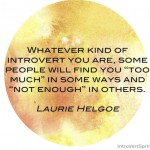
Many Introverts need a coping mechanism to stay positive with our everyday challenges in dealing with adverse events. Managing difficult situations causes stress and anxiety, making us less tolerant. An example of this was during the Covid-19 pandemic which caused people to adopt unhealthy coping mechanisms.
The instances of drug abuse, alcoholism, physical abuse, and weight gain rose dramatically during this time. Harmful coping mechanisms can become a crutch that you rely on too much. Zocdoc’s article on unhelpful coping mechanisms gives examples of what to avoid so that you can put preventative measures in place so that you don’t adopt unhealthy practices.
When faced with something outside our comfort zone, many introverts use a coping mechanism to be able to carry on. In our own time and space, processing and planning will bring to the forefront any trauma stressful events may cause us. This way, we can find solutions beforehand and determine how to proceed.
Coping by using a healthy example leaves you refreshed and ready to get on with your everyday tasks. This could be taking time out, reading a book, doing yoga, or any other fun, pleasurable activity.
So, with all that in mind, let’s take a look at some useful coping strategies.
Talk to Others
Even when introverts prefer to lock ourselves away and shut out the world, it is still important to share our fears. Communication is vital in dealing with your feelings when things go wrong. You may feel overwhelmed and annoyed by others, but they can help you work through the reasons for not coping as well as you should be.
By talking through a problem or worry, you may discover the answer is simple, giving you peace of mind and allowing you to return to your reserved lifestyle.
Take care of Yourself
By looking after your body and mind, you will feel better physically and mentally, making it easier to cope with a stressful situation. Sleep is a natural healer; it refreshes your mind and body, leaving you feeling rejuvenated and able to face your problems.
Physical activity is another excellent healthy coping method that speeds up the production of your brain’s feel-good enzymes, called endorphins. This gives you a brighter, happier outlook. It increases your self-esteem and helps you to cope with anything. For an introvert, it is an ideal way to manage, as the solitude of walking or working out means you have plenty of time to recharge yourself.
Connect with your spiritual side
It is often said that spirituality goes hand in hand with the nature of an introvert, as discussed in an article by the Peace Blog on exploring spirituality. Extroverts and introverts both practice spiritual activities in different ways. Extroverts enjoy large social gatherings and feed off the energy it generates, whereas we like focusing on our inner thoughts and ideas.
Introverts find strength in solitude and being alone. We follow the path of seclusion and isolation, which is often considered a traditional spiritual discipline. Biblically speaking, alone time is when we can connect with our spiritual side, talk with God, share our deepest concerns, and allow His strength to envelop us. These precious moments of simply being with our creator strengthen our way of coping and help us to refocus on what is good in our life.
Avoid Drugs and Alcohol
Using drugs and alcohol is seen as one of the most extensive coping mechanisms in the world today. They provide respite by enhancing pleasure and decreasing anxiety and inhibitions. Unfortunately, these short-lived effects lead to more constant use and addiction.
This unhealthy way of coping with unhappiness, stress, and other emotional problems is brought about by substances disrupting the normal function of our brain. It masks our negative feelings, putting our issues to the back of our minds and giving us a sense of relief to enjoy this newfound euphoria.
By avoiding these unhealthy practices, our mind and body can logically determine the best path to follow. Our article on ‘Are Introverts More Likely To Become Addicted To Drugs’ discusses the risk of addiction for those who are isolated and how to avoid it.
Keep Busy
Ensuring our mind is busy focusing on other projects helps us numb painful emotions. When our brain is active, it produces endorphins, known as happy hormones, which help us to feel confident and optimistic.
This is a healthy coping mechanism because it raises our self-confidence and our sense of achievement. But of course, don’t go overboard. While it is excellent for our mental health in the first instance, putting problems in the back of your mind is not a long-term solution.
According to psychology expert Dr. Cheyenne Bryant, constantly being on the go and trying to hide what is happening can cause fatigue, eventually leading to burnout. Some sound advice is that while feeling euphoric, face your demons and deal with them.










